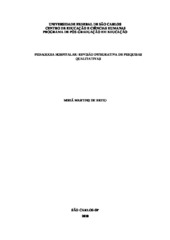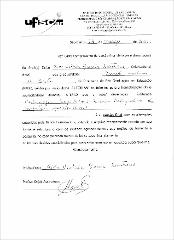Mostrar el registro sencillo del ítem
Pedagogia Hospitalar: revisão integrativa de pesquisas qualitativas
| dc.contributor.author | Brito, Miriã Martins de | |
| dc.date.accessioned | 2020-05-04T12:29:10Z | |
| dc.date.available | 2020-05-04T12:29:10Z | |
| dc.date.issued | 2020-02-20 | |
| dc.identifier.citation | BRITO, Miriã Martins de. Pedagogia Hospitalar: revisão integrativa de pesquisas qualitativas. 2020. Dissertação (Mestrado em Educação) – Universidade Federal de São Carlos, São Carlos, 2020. Disponível em: https://repositorio.ufscar.br/handle/ufscar/12678. | * |
| dc.identifier.uri | https://repositorio.ufscar.br/handle/ufscar/12678 | |
| dc.description.abstract | Introduction: The process of hospitalization is sometimes a moment that brings suffering to the lives of children and this time can interfere in their physical, emotional and cognitive development. The conjunction between the fields of Education and Health, in a perspective of humanization of its service, enables the hospitalized children the guarantee of getting their education, even in the period of health treatment. Research in this field is still scarce, so it constantly presents in its results the need for further investigation on this subject. In an attempt to fill the gaps about the educational attendance, it became necessary to understand the discussions presented on scientific papers and how the educational theories may contribute to the area. Objective: To characterize and analyze the scientific production about the Hospital Class, according to the theoretical framework of education. Method: this is an Integrative Review of qualitative research conducted in five stages based on the method of Whittemore and Knafl (2005), which are formulation and identification of the problem, data collection, data evaluation, analysis and interpretation of the collected data and presentation of the data. From the definition of the object of research, as well as the aim and review, data collection was carried out in the following databases: BDTD, Scielo, ERIC, PubMed and Web of Science. The following data portals were also considered Capes and BVS, using the following descriptors: “Educational Service AND Hospital Class”; “Special Education AND Hospital Class”, “Hospitalized AND Children” and (“Hospital Classes” OR “Hospital Schools”) AND Children. As inclusion criteria we define: a) the productions, both theses and dissertations, articles whose texts were complete and available for free; b) productions in the following languages Portuguese, English and Spanish; c) Qualitative studies; d) productions that deal with the hospital class, educational assistance in the hospital context and / or hospital pedagogy; e) Researches published between 2002 and 2019. As exclusion criteria: a) studies whose full texts were not available for free; b) productions that did not demonstrate in their core theoretical, methodological or scientific and ethical rigor and c) productions of a quantitative, qualitative-quantitative (mixed) nature, bibliographic reviews and other types of studies. Results: 164 productions were found, which, when passing through the collection stages, totaled 26 works, which used for the analysis. After the categorization and analyses according to their type, year and place of publication and method, the productions were identified regarding the collaborating subjects of the research, objectives and synthesis of the results, themes and authors / references found. From the result, it emerged categories, such as “Hospital Pedagogy: From invisibility to the comprehension and the guarantee to the right to educational hospital care”; “Hospital Class: From the understanding of educational activities in the hospital context” and “Pedagogue Hospital: From teacher training to acting in a hospital environment”. Discussion: We highlighted three main issues: the need to implement hospital classes, approximation of the fields of health and education and the training of educators to work in the hospital environment. Some considerations: We point to the need for more qualitative research on Hospital Pedagogy, as investigations in this field, which can contribute to the dissemination of the theme, and more practical results, such as the creation of workshops, specialization courses and training, which may result in the approximation of the education and health areas. We conclude that as long as there is no disclosure of this right, there can also be no recognition of its importance. | eng |
| dc.description.sponsorship | Coordenação de Aperfeiçoamento de Pessoal de Nível Superior (CAPES) | por |
| dc.language.iso | por | por |
| dc.publisher | Universidade Federal de São Carlos | por |
| dc.rights | Attribution-NonCommercial-NoDerivs 3.0 Brazil | * |
| dc.rights.uri | http://creativecommons.org/licenses/by-nc-nd/3.0/br/ | * |
| dc.subject | Processos educativos | por |
| dc.subject | Classe hospitalar | por |
| dc.subject | Atendimento educacional hospitalar | por |
| dc.subject | Educational processes | eng |
| dc.subject | Hospital class | eng |
| dc.subject | Educational hospital service | eng |
| dc.title | Pedagogia Hospitalar: revisão integrativa de pesquisas qualitativas | por |
| dc.title.alternative | Hospital Pedagogy: integrative review of qualitative research | eng |
| dc.type | Dissertação | por |
| dc.contributor.advisor1 | Montrone, Aida Victoria Garcia | |
| dc.contributor.advisor1Lattes | http://lattes.cnpq.br/9011731777978672 | por |
| dc.description.resumo | Introdução: O processo de hospitalização, por vezes é um momento que traz sofrimento para a vida das crianças, podendo interferir no seu desenvolvimento físico, emocional e cognitivo. A junção entre os campos da Educação e Saúde em uma perspectiva de humanização de atendimento, pode possibilitar às crianças hospitalizadas a garantia do direito à escolarização. As pesquisas nesse campo ainda são poucas, e apresentam constantemente em seus resultados a necessidade de investigações mais aprofundadas acerca dessa temática. Na tentativa de encontrar as lacunas a serem preenchidas acerca do atendimento educacional hospitalar, tornou-se necessário identificar e analisar quais discussões vem sendo abordadas nas produções científicas, e como o referencial da educação contribui para os debates nessa área. Objetivo: Caracterizar e analisar a produção científica acerca da Classe Hospitalar, segundo o referencial teórico de educação. Método: Trata-se de uma Revisão Integrativa de pesquisas qualitativas realizada em cinco etapas, baseadas no método de Whittemore e Knafl (2005), sendo elas: formulação e identificação do problema, coleta de dados, avaliação dos dados, análise e interpretação dos dados coletados e apresentação dos dados. A partir da definição da questão de estudo, bem como do objetivo e protocolo de revisão, foi realizada a coleta de dados nos seguintes bancos de dados: BDTD, Scielo, ERIC, PubMed e Web Of Science e também os seguintes portais de dados: Capes e BVS, utilizando-se dos seguintes descritores: “Atendimento Educacional AND Classe hospitalar”; “Educação Especial AND Classe Hospitalar”, “Hospitalized AND Children” e (“Hospital Classes” OR “Hospital Schools”) AND Children. Como critérios de inclusão definimos: a) as produções, tanto teses, dissertações e artigos cujos textos estivessem completos e disponibilizados gratuitamente; b) produções em idiomas: Português, Inglês e Espanhol; c) Estudo qualitativos; d) produções que versem acerca da classe hospitalar, do atendimento educacional no contexto hospitalar e/ou pedagogia hospitalar; e) Pesquisas publicadas dentro dos anos de 2002 até o ano de 2019. Já como critérios de exclusão: a) estudos cujos textos completos não estivessem disponibilizados gratuitamente; b) produções que não demonstrassem em seu bojo o referencial teórico, metodológico ou rigor cientifico e ético e c) produções de caráter quantitativo, quali-quanti (mistos), revisões bibliográficas e outros tipos de estudos. Resultados: Foram encontradas 164 produções, que ao passarem pelas etapas do protocolo, totalizaram-se em 26 trabalhos para a análise. Depois de categorizadas e analisadas de acordo com tipo, ano e local de publicação e método, as produções foram identificadas quanto aos sujeitos colaboradores/as de pesquisa, objetivo, síntese dos resultados, temáticas e autores/as referenciais encontrados. A partir do resultado, surgiram as categorias “Pedagogia Hospitalar: Da invisibilidade à compreensão e garantia do direito ao atendimento educacional hospitalar”; “Classe Hospitalar: Da compreensão das atividades educacionais no contexto hospitalar” e “Pedagogo/a Hospitalar: Da formação docente para atuação em ambiente hospitalar”. Discussão: Evidenciamos três principais questões: necessidade de implementação das classes hospitalares; aproximação dos campos da saúde e educação e formação de pedagogos/as para atuarem no ambiente hospitalar. Algumas considerações: Apontamos para a necessidade de mais pesquisas qualitativas acerca da Pedagogia Hospitalar, pois as investigações nesse campo, podem contribuir para a divulgação do tema, e também em resultados mais práticos como a criação de oficinas, cursos de especializações e formação, aproximando as áreas da educação e da saúde. Concluímos que enquanto não houver a divulgação desse direito, não pode haver também o reconhecimento da sua importância. | por |
| dc.publisher.initials | UFSCar | por |
| dc.publisher.program | Programa de Pós-Graduação em Educação - PPGE | por |
| dc.subject.cnpq | CIENCIAS HUMANAS::EDUCACAO::TOPICOS ESPECIFICOS DE EDUCACAO | por |
| dc.subject.cnpq | CIENCIAS DA SAUDE::SAUDE COLETIVA::SAUDE PUBLICA | por |
| dc.description.sponsorshipId | CAPES: 88882.426342 | por |
| dc.publisher.address | Câmpus São Carlos | por |
| dc.contributor.authorlattes | http://lattes.cnpq.br/8425431356929720 | por |


